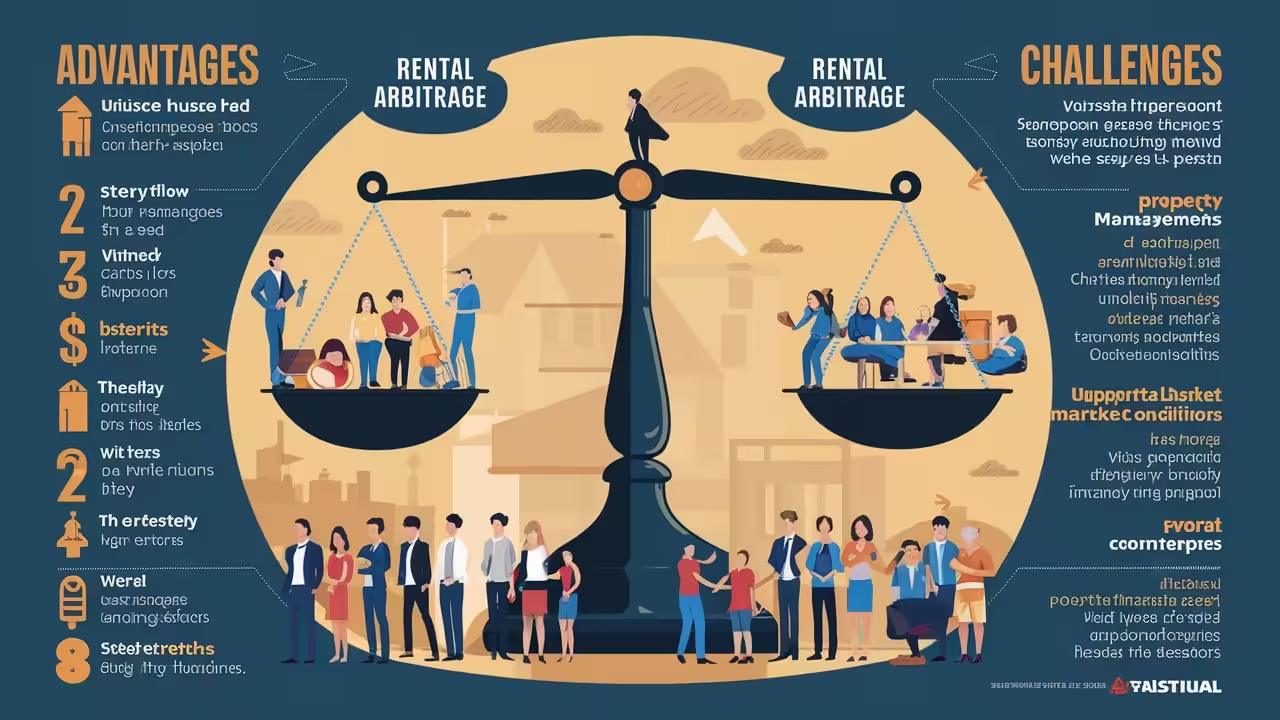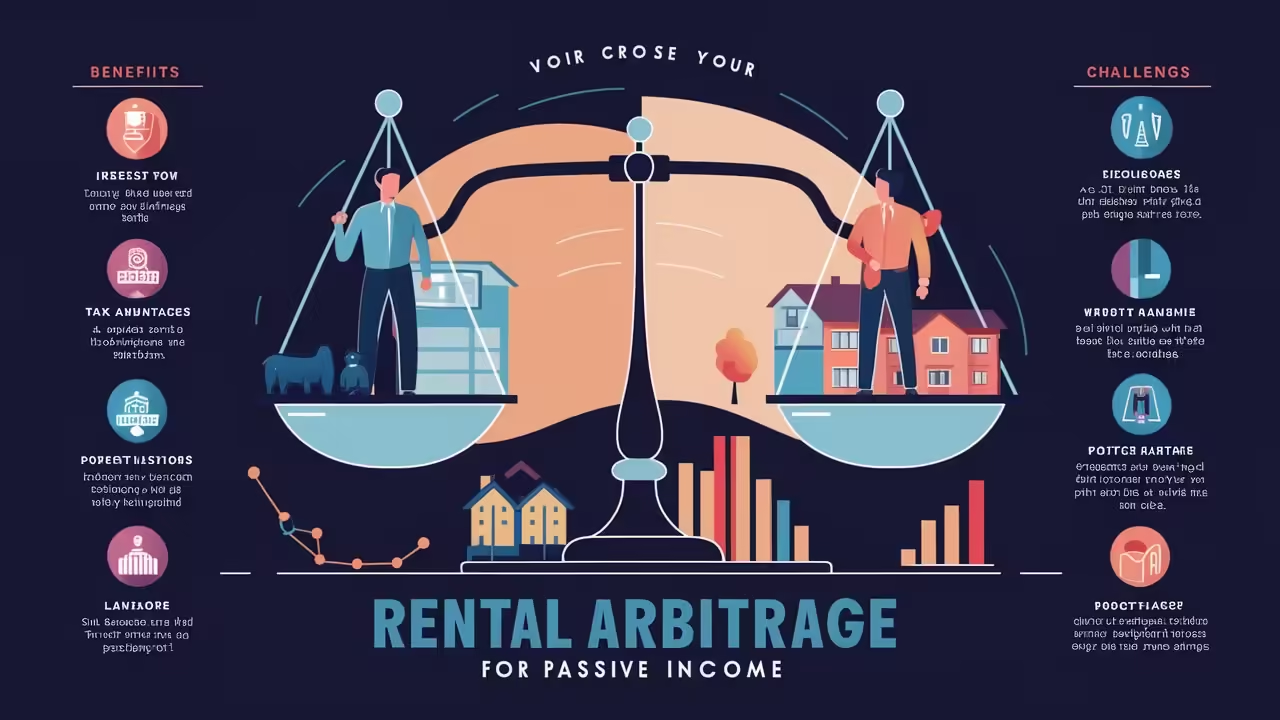Table of Contents
ToggleRental Arbitrage: Passive Income Strategies

Introduction
Passive income has become a popular buzzword in the financial world, offering a pathway to financial freedom and flexibility. One of the most compelling avenues for passive income is through rental properties. Within this domain, rental arbitrage stands out as a unique strategy. This article delves into the intricacies of rental arbitrage, exploring its pros and cons as a passive income strategy.
Rental arbitrage involves leasing properties long-term and renting them out short-term, often through platforms like Airbnb. This method capitalizes on the difference between long-term rental rates and the potentially higher income from short-term rentals. While it presents an attractive opportunity, rental arbitrage also comes with its own set of challenges. Understanding both sides of this strategy is crucial for anyone considering it as a means of generating passive income.
The Concept of Rental Arbitrage
What is Rental Arbitrage?
Rental arbitrage is a business model where an individual rents a property from a landlord and then sublets it to short-term tenants. The key to successful rental arbitrage is securing a long-term lease at a lower cost and generating higher revenue by renting the property on a short-term basis. This strategy leverages market discrepancies to create a profit margin.
How Does Rental Arbitrage Work?
- Finding the Right Property: The first step involves identifying properties in high-demand areas, typically urban centers or tourist destinations.
- Negotiating a Lease: Next, the prospective rental arbitrager negotiates a long-term lease with the property owner, often securing favorable terms.
- Listing the Property: Once the lease is signed, the property is listed on short-term rental platforms such as Airbnb or Vrbo.
- Managing Rentals: The arbitrager manages bookings, guest communications, cleaning, and maintenance, aiming to maximize occupancy and nightly rates.
Advantages of Rental Arbitrage
Low Initial Investment
One of the primary advantages of rental arbitrage is the relatively low initial investment required. Unlike traditional property investment, which necessitates a significant down payment and mortgage, rental arbitrage only requires securing a lease. This reduces the barrier to entry, making it accessible to more people.
High Cash Flow Potential
Rental arbitrage can yield high cash flow if managed correctly. The difference between the long-term lease cost and the income from short-term rentals can result in substantial profits. This high cash flow potential is especially evident in high-demand areas where short-term rental rates are significantly higher than long-term leases.
Flexibility and Scalability
Rental arbitrage offers flexibility and scalability. Investors can start with one property and gradually expand their portfolio. Since the model doesn’t require property ownership, scaling up can be faster and less capital-intensive compared to traditional real estate investments.
Reduced Risk
Since rental arbitragers do not own the properties, they are insulated from market fluctuations that affect property values. This reduced risk can be particularly appealing in volatile real estate markets.
Opportunity for Market Exploration
Rental arbitrage allows investors to test different markets without committing to a property purchase. This can be a strategic advantage, enabling them to identify profitable locations and adapt their strategy based on market performance.
Disadvantages of Rental Arbitrage
Legal and Regulatory Challenges
One of the most significant disadvantages of rental arbitrage is navigating legal and regulatory challenges. Many cities have stringent laws governing short-term rentals, and failure to comply can result in hefty fines or legal action. It’s crucial for rental arbitragers to thoroughly understand local regulations and obtain necessary permits.
Lease Agreement Restrictions
Not all landlords are open to rental arbitrage. Many lease agreements explicitly prohibit subletting, making it challenging to find properties that allow this strategy. Negotiating terms that permit subletting can be difficult and time-consuming.
Operational Complexity
Managing short-term rentals involves considerable operational complexity. It requires constant attention to bookings, guest communications, cleaning, and maintenance. This operational burden can be overwhelming, particularly for those managing multiple properties.
Market Dependency
Rental arbitrage income is heavily dependent on market conditions. Factors such as seasonality, economic downturns, and travel restrictions can significantly impact occupancy rates and revenue. This market dependency introduces a level of uncertainty and risk.
Potential for Disputes
Subletting can sometimes lead to disputes with landlords or homeowners’ associations. If a landlord discovers unauthorized subletting, it can result in eviction or legal action. Maintaining clear and honest communication with property owners is essential to avoid conflicts.

Setting Up for Success in Rental Arbitrage
Research and Planning
Thorough research and planning are critical for success in rental arbitrage. Prospective arbitragers should study market demand, rental rates, and local regulations. Planning should also involve financial projections and contingency strategies to manage potential risks.
Building Relationships with Property Owners
Establishing strong relationships with property owners can facilitate favorable lease agreements. Transparency and trust are crucial in convincing landlords to permit subletting. Offering guarantees such as higher security deposits or maintenance agreements can also help in negotiations.
Professional Management
Given the operational complexities, many rental arbitragers opt for professional management services. These services handle bookings, guest communications, cleaning, and maintenance, allowing investors to focus on scaling their portfolio.
Dynamic Pricing Strategies
Implementing dynamic pricing strategies can maximize revenue. Tools that adjust rental rates based on market demand, seasonality, and local events can help maintain high occupancy rates and optimize nightly rates.
Legal Compliance
Ensuring legal compliance is non-negotiable in rental arbitrage. Investors must stay updated on local regulations, obtain necessary permits, and adhere to tax obligations. Consulting with legal professionals can provide clarity and prevent potential legal issues.
Case Studies: Successful Rental Arbitrage Ventures
Urban Centers: High-Demand Markets
In cities like New York, San Francisco, and Los Angeles, rental arbitrage has proven highly profitable due to the high demand for short-term rentals. Investors who secured long-term leases in desirable neighborhoods and listed properties on platforms like Airbnb have seen significant returns.
Tourist Destinations: Seasonal Opportunities
Tourist destinations such as Orlando, Miami, and Las Vegas offer lucrative opportunities for rental arbitrage. Investors capitalize on peak tourist seasons by adjusting rental rates and maintaining high occupancy during these periods.
Business Hubs: Corporate Rentals
Cities with a high influx of business travelers, like Chicago and Seattle, present unique opportunities for corporate rentals. Offering properties tailored to business travelers can ensure consistent bookings and high rental rates.
Common Pitfalls in Rental Arbitrage
Underestimating Expenses
A common pitfall in rental arbitrage is underestimating expenses. Costs such as utilities, maintenance, cleaning, and platform fees can quickly add up, eating into profits. Accurate budgeting and financial planning are essential to avoid this mistake.
Ignoring Market Trends
Ignoring market trends and demand fluctuations can lead to poor performance. Investors must stay informed about market conditions and adjust their strategies accordingly. This involves monitoring local events, travel trends, and economic factors that influence demand.
Poor Property Management
Inefficient property management can result in negative guest experiences and poor reviews. High ratings and positive reviews are crucial for maintaining occupancy rates. Investing in professional management services or adopting best practices for guest management can mitigate this risk.
Inadequate Legal Knowledge
Lack of legal knowledge can lead to compliance issues and potential fines. Rental arbitragers must educate themselves on local laws and regulations governing short-term rentals. Legal advice should be sought to navigate complex regulatory environments.
Overleveraging
Overleveraging, or taking on too many properties without adequate financial backing, can lead to financial strain. Investors should carefully assess their financial capacity and avoid overextending themselves.
Future Trends in Rental Arbitrage
Technology Integration
Technology is playing an increasingly vital role in rental arbitrage. Automated booking systems, dynamic pricing tools, and virtual property tours are enhancing efficiency and guest experiences. Embracing these technologies can provide a competitive edge.
Sustainable Practices
Sustainability is becoming a significant trend in the hospitality industry. Incorporating eco-friendly practices and promoting sustainable accommodations can attract environmentally conscious travelers and differentiate properties in a competitive market.
Remote Work Influence
The rise of remote work has led to increased demand for short-term rentals in non-traditional locations. Investors can capitalize on this trend by exploring suburban or rural markets that offer attractive remote work environments.
Niche Markets
Focusing on niche markets, such as pet-friendly accommodations, family-oriented rentals, or luxury stays, can cater to specific traveler segments. Tailoring properties to meet the needs of these niches can enhance occupancy rates and profitability.
Regulatory Evolution
As short-term rentals become more prevalent, regulatory landscapes are likely to evolve. Staying ahead of regulatory changes and adapting strategies to comply with new laws will be crucial for long-term success in rental arbitrage.

Strategies to Mitigate Risks in Rental Arbitrage
Comprehensive Insurance Coverage
Insurance is a vital component of risk management in rental arbitrage. Standard tenant insurance may not cover all scenarios related to short-term rentals. Investors should seek comprehensive insurance policies that cover property damage, liability, and loss of income. Platforms like Airbnb offer host protection insurance, but additional coverage can provide greater peace of mind.
Diversifying Property Portfolio
Diversification is a key strategy to mitigate risks. By spreading investments across multiple properties in different locations, investors can reduce dependency on a single market. This approach can buffer against regional market downturns and seasonal fluctuations, ensuring a more stable income stream.
Emergency Fund Allocation
Maintaining an emergency fund is essential to handle unexpected expenses or periods of low occupancy. This fund can cover costs such as repairs, legal fees, or temporary vacancies, preventing financial strain during unforeseen circumstances.
Regular Property Maintenance
Regular maintenance and prompt repairs are crucial for maintaining property value and ensuring guest satisfaction. Investors should establish a routine maintenance schedule and address issues immediately to avoid larger, costlier problems down the line. High property standards lead to positive reviews, higher occupancy rates, and repeat bookings.
Effective Marketing Strategies
Effective marketing strategies can enhance visibility and attract more bookings. Utilizing professional photography, detailed property descriptions, and leveraging social media platforms can drive traffic to listings. Additionally, offering promotions or discounts during off-peak seasons can maintain steady occupancy rates.
Collaboration with Local Businesses
Collaborating with local businesses can enhance guest experiences and provide mutual benefits. Partnerships with restaurants, tour operators, and transportation services can offer guests added value and convenience. These collaborations can also lead to cross-promotional opportunities, driving more bookings.
Utilizing Data Analytics
Data analytics can provide valuable insights into market trends, pricing strategies, and guest preferences. Tools that analyze occupancy rates, rental income, and market demand can help investors make informed decisions. By leveraging data, rental arbitragers can optimize pricing, improve marketing strategies, and enhance overall performance.
Environmental and Social Responsibility in Rental Arbitrage
Eco-Friendly Practices
Incorporating eco-friendly practices in rental properties can attract environmentally conscious travelers and reduce operational costs. Simple measures such as energy-efficient appliances, recycling programs, and sustainable amenities can make a significant impact. Promoting these practices in listings can appeal to a growing segment of eco-conscious consumers.
Supporting Local Communities
Supporting local communities can enhance the reputation of rental properties and foster positive relationships with neighbors and local authorities. Investors can contribute to community projects, source supplies locally, and encourage guests to patronize local businesses. Demonstrating a commitment to the community can build goodwill and support for the rental business.
Ethical Hosting
Ethical hosting practices ensure that the benefits of rental arbitrage are shared fairly. This includes paying fair wages to cleaning and maintenance staff, providing safe and comfortable accommodations for guests, and adhering to all legal and regulatory requirements. Ethical practices build trust and credibility, contributing to long-term success.
Conclusion
Rental arbitrage presents a unique and potentially lucrative strategy for generating passive income through rental properties. By leveraging market discrepancies and short-term rental platforms, investors can achieve high cash flow with relatively low initial investment. However, this strategy is not without its challenges. Navigating legal regulations, managing operational complexities, and staying informed about market trends are crucial for success. By thoroughly researching and planning, building strong relationships with property owners, and ensuring legal compliance, aspiring rental arbitragers can capitalize on this dynamic market and build a sustainable passive income stream.
In summary, rental arbitrage offers an accessible entry point into the real estate market with the potential for high returns. With careful planning, strategic management, and a commitment to best practices, investors can overcome challenges and thrive in this competitive industry. As the market evolves, staying adaptable and informed will be key to maintaining profitability and achieving long-term success in rental arbitrage.
For more information regarding Finance Basic you can visit FinancewithAi Channel & Home

FAQs
What is rental arbitrage?
Rental arbitrage involves leasing properties long-term and renting them out short-term to capitalize on the difference in rental rates.
Is rental arbitrage legal?
Rental arbitrage legality varies by location. It’s essential to research and comply with local regulations and obtain necessary permits.
How much can I earn from rental arbitrage?
Earnings from rental arbitrage depend on factors like location, demand, and management efficiency. High-demand areas can yield significant profits.
What are the risks of rental arbitrage?
Risks include legal challenges, market dependency, operational complexity, and potential disputes with landlords.
Do I need a lot of money to start rental arbitrage?
Rental arbitrage requires less initial capital compared to property ownership. However, securing leases and managing expenses still necessitate financial planning.
Can I scale my rental arbitrage business?
Yes, rental arbitrage is scalable. Investors can start with one property and gradually expand their portfolio by reinvesting profits.
What are Passive Income Strategies?
Passive income strategies are methods of earning income with minimal daily effort. Unlike active income, which requires continuous work and time investment, passive income streams can generate revenue consistently with less ongoing effort once established.
What Are Some Common Passive Income Strategies?
- Real Estate Investments: Purchasing rental properties or investing in real estate investment trusts (REITs).
- Dividend Stocks: Investing in stocks that pay dividends regularly.
- Peer-to-Peer Lending: Providing loans to individuals or businesses via online platforms in exchange for interest payments.
- Create Digital Products: Selling eBooks, online courses, or software.
- Affiliate Marketing: Promoting products or services online and earning commissions.
- Licensing and Royalties: Earning from intellectual property such as patents, music, or books.
- High-Yield Savings Accounts and Bonds: Earning interest from savings or bonds.
How Do Dividend Stocks Generate Passive Income?
Dividend stocks are shares in companies that distribute a portion of their earnings to shareholders regularly. Investors receive dividends, typically quarterly, providing a steady income stream. Reinvesting these dividends can also enhance growth through compounding.
What Are the Risks Associated with Passive Income Strategies?
While passive income strategies can be highly rewarding, they also come with risks:
- Market Risk: Investments in stocks or real estate can be volatile and affected by market fluctuations.
- Credit Risk: Peer-to-peer lending involves the risk of borrower default.
- Operational Risk: Managing rental properties can require effort and unforeseen expenses.
- Technological Risk: Digital products may become obsolete or face competition.
How Can I Start Earning Passive Income Through Real Estate?
To start earning passive income through real estate, consider the following steps:
- Research and Education: Learn about different types of real estate investments, market conditions, and investment strategies.
- Financial Planning: Assess your financial situation and determine your budget for real estate investment.
- Property Selection: Choose properties in high-demand areas with potential for appreciation and rental income.
- Financing: Secure financing through savings, loans, or partnerships.
- Management: Decide whether to manage properties yourself or hire a property management company.
What Is the Role of REITs in Generating Passive Income?
Real Estate Investment Trusts (REITs) are companies that own, operate, or finance income-producing real estate. By investing in REITs, individuals can earn a share of the income produced through commercial real estate ownership without directly buying properties. REITs typically pay high dividends, making them an attractive option for passive income.
How Does Affiliate Marketing Work as a Passive Income Strategy?
Affiliate marketing involves promoting products or services on your website, blog, or social media channels. You earn a commission for every sale made through your referral link. Key steps include:
- Choosing a Niche: Focus on a specific area of interest or expertise.
- Joining Affiliate Programs: Partner with companies offering affiliate programs.
- Creating Content: Develop valuable content that attracts and engages your target audience.
- Promoting Affiliate Links: Embed referral links in your content and drive traffic through SEO, social media, and email marketing.
What Are the Benefits of Peer-to-Peer Lending?
Peer-to-peer lending platforms connect individual lenders with borrowers, bypassing traditional banks. Benefits include:
- High Returns: Potential for higher returns compared to traditional savings accounts.
- Diversification: Spread your investment across multiple loans to mitigate risk.
- Accessibility: Easy online access to lending opportunities with relatively low minimum investment requirements.
How Can Creating Digital Products Generate Passive Income?
Creating digital products like eBooks, online courses, and software can generate passive income by:
- Initial Effort: Invest time upfront to create valuable content.
- Automation: Use platforms that automate sales, distribution, and customer service.
- Scalability: Sell to a global audience without additional production costs.
What Are Some Tips for Successful Dividend Investing?
- Research Companies: Invest in financially stable companies with a history of paying dividends.
- Diversify: Spread investments across different sectors to reduce risk.
- Reinvest Dividends: Use dividend reinvestment plans (DRIPs) to buy more shares and compound returns.
- Monitor Performance: Regularly review and adjust your portfolio based on performance and market conditions.
How Do High-Yield Savings Accounts and Bonds Generate Passive Income?
High-yield savings accounts and bonds generate passive income through interest payments:
- High-Yield Savings Accounts: Offer higher interest rates than traditional savings accounts, providing a steady, risk-free income.
- Bonds: Government or corporate bonds pay periodic interest, known as coupon payments, to bondholders until maturity.
What Are Licensing and Royalties in Passive Income?
Licensing and royalties involve earning from intellectual property:
- Licensing: Granting permission to use your intellectual property (e.g., patents, trademarks) in exchange for fees.
- Royalties: Earning a percentage of revenue from your creations (e.g., books, music) whenever they are sold or used.
Can Passive Income Be Truly Passive?
While passive income requires less daily involvement than active income, it is rarely completely passive. Initial efforts in research, setup, and management are necessary. Regular monitoring and occasional adjustments are also needed to ensure the income stream remains viable and profitable.
How Can I Diversify My Passive Income Streams?
Diversification reduces risk and enhances stability. To diversify your passive income streams:
- Invest in Different Assets: Real estate, stocks, bonds, and digital products.
- Vary Income Sources: Dividend stocks, rental properties, peer-to-peer lending, and affiliate marketing.
- Explore New Opportunities: Stay informed about emerging trends and technologies that can create new passive income opportunities.
What Are Some Passive Income Ideas for Beginners?
Beginners can explore several passive income ideas with low barriers to entry:
- High-Yield Savings Accounts: Safe and simple with guaranteed returns.
- Dividend Stocks: Start with a small investment in dividend-paying stocks.
- Peer-to-Peer Lending: Invest small amounts in multiple loans to spread risk.
- Affiliate Marketing: Promote products through a blog or social media.
- Create an eBook: Write about a topic you are passionate about and sell it online.
How Important Is Financial Education in Building Passive Income?
Financial education is crucial for building and maintaining passive income. Understanding investment principles, market dynamics, and risk management helps make informed decisions, maximize returns, and avoid potential pitfalls. Continuous learning and staying updated with financial news and trends are essential.
What Role Does Technology Play in Passive Income Strategies?
Technology plays a significant role in passive income strategies by:
- Automation: Streamlining processes like marketing, sales, and customer service.
- Access to Platforms: Enabling investments through online platforms (e.g., REITs, peer-to-peer lending).
- Data Analytics: Providing insights into market trends and investment performance.
- Global Reach: Allowing digital products and services to reach a wider audience.
How Can I Ensure Legal Compliance in Passive Income Ventures?
Legal compliance is vital to avoid penalties and protect your investments:
- Research Regulations: Understand local laws governing your income streams (e.g., rental properties, online businesses).
- Consult Professionals: Seek advice from legal and financial experts.
- Maintain Documentation: Keep thorough records of all transactions and agreements.
- Adhere to Tax Laws: Ensure you comply with tax obligations and file returns accurately and on time.
What Are Some Long-Term Passive Income Strategies?
Long-term passive income strategies focus on sustainability and growth:
- Real Estate: Investing in properties that appreciate over time.
- Dividend Stocks: Building a diversified portfolio for steady income.
- Index Funds: Investing in funds that track market indices for broad exposure.
- Retirement Accounts: Contributing to accounts like 401(k)s or IRAs with tax advantages.
How Can Passive Income Contribute to Financial Independence?
Passive income can contribute to financial independence by:
- Supplementing Active Income: Reducing reliance on a single income source.
- Building Wealth: Reinvesting earnings to grow assets over time.
- Providing Flexibility: Allowing for lifestyle choices without financial constraints.
- Creating Security: Offering a safety net during economic downturns or job loss.
What Are the Tax Implications of Passive Income?
Tax implications of passive income vary by source and jurisdiction:
- Rental Income: Subject to income tax, with potential deductions for expenses.
- Dividends: Taxed at different rates depending on whether they are qualified or ordinary.
- Interest Income: Taxed as ordinary income.
- Royalties and Licensing: Subject to income tax, with potential deductions for related expenses.
Consulting with a tax professional can help optimize your tax strategy and ensure compliance.
How Can I Manage Time Effectively When Pursuing Passive Income?
Effective time management is key to balancing passive income ventures with other commitments:
- Prioritize Tasks: Focus on high-impact activities that generate the most income.
- Automate Processes: Use technology to streamline routine tasks.
- Outsource: Delegate tasks like property management or content creation.
- Set Goals: Establish clear, achievable goals and track progress regularly.
Are There Any Ethical Considerations in Passive Income Strategies?
Ethical considerations in passive income strategies involve:
- Transparency: Being honest with customers, tenants, and partners.
- Fair Practices: Ensuring fair treatment of employees, contractors, and borrowers.
- Community Impact: Considering the effects of your investments on local communities and the environment.
- Sustainability: Promoting practices that support long-term environmental and social well-being.
Share this:
- Click to share on LinkedIn (Opens in new window)
- Click to share on Reddit (Opens in new window)
- Click to share on Tumblr (Opens in new window)
- Click to share on Pinterest (Opens in new window)
- Click to share on Pocket (Opens in new window)
- Click to share on Telegram (Opens in new window)
- Click to share on Threads (Opens in new window)
- Click to share on WhatsApp (Opens in new window)
- Click to share on Mastodon (Opens in new window)
- Click to share on Nextdoor (Opens in new window)
- Click to share on Bluesky (Opens in new window)